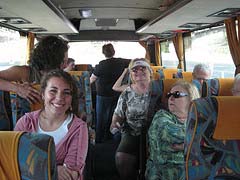On the LadinoBus with Judith Cohen in Turkey
Judith Cohen writes to the Jewish-Music list about her travels.
 hi, well, it wasn't called LadinoBus, but that's what it was—I'm just back in Madrid from a couple of weeks hanging out on a bus careening through Turkey with a bunch of Sephardim mostly in their 70s and 80s, speaking Ladino (which is what most of them have resignedly taking to calling it these days; it isn't what any of them said at home) and visiting the cities they or their parents were born in; then a week in Bulgaria mostly with Sephardim as well, in their case mostly resisting the use of the term "Ladino" ("we don't care what they've decided in Turkey or Israel; Ladino isn't what is spoken"). I was on the Turkey trip as a sort of domesticated ethnomusicologist, and it was quite fascinating to see what memories of songs (and stories, recipes, proverbs etc ) the trip stirred up, between the places themselves, the interaction with others on the bus, and the interaction with Sephardim who had stayed in these cities all along.…
hi, well, it wasn't called LadinoBus, but that's what it was—I'm just back in Madrid from a couple of weeks hanging out on a bus careening through Turkey with a bunch of Sephardim mostly in their 70s and 80s, speaking Ladino (which is what most of them have resignedly taking to calling it these days; it isn't what any of them said at home) and visiting the cities they or their parents were born in; then a week in Bulgaria mostly with Sephardim as well, in their case mostly resisting the use of the term "Ladino" ("we don't care what they've decided in Turkey or Israel; Ladino isn't what is spoken"). I was on the Turkey trip as a sort of domesticated ethnomusicologist, and it was quite fascinating to see what memories of songs (and stories, recipes, proverbs etc ) the trip stirred up, between the places themselves, the interaction with others on the bus, and the interaction with Sephardim who had stayed in these cities all along.…
I was trying to get past the usual Top Ten Sephardic Hits, which of course they all knew (either from home or, more often, from Yehoram Gaon and other recordings) and see/hear what they remembered of the older repertoire, if not to sing themselves (almost none could) then at least to comment on. The idea was to speak (Ladino, Judeo-Spanish, spaniol, djudezmo, djidio, whatever) all the time, and mostly we did, though English, French, Turkish and Hebrew, depending on the circumstances and the people, crept in. I played percussion for Izzet Bana's children's choir and adult choir in Istanbul, also taught quite a few songs on hours on the bus. In Bulgaria I was vastly amused when a small group of Sephardim in their late 70s and 80s put on a skit making fun of Bulgarian villagers and village dancing, then said they were too tired to sing, but when the sound technician put on some Bulgarian village dance music as he was packing up, they started dancing an energetic 9/8 ... (and I ended up leading the dance; they hadn't realized I also knew Balkan singing and dancing.)
Anyway, I haven't time to write a full account of all this but it was on the one hand, a great experience, both personally and professionally, and on the other hand, very sad to see how very very little of the old repertoire and singing style remains, even in people's memories, for various historical and social reasons, but also for reasons of the ubiquity of commercial recordings with the same dozen or so songs, most with largely Western European-style melodies, from the beginning of the 20th century. As an ethnomusicologist I'm just supposed to—well, you know, record, do fieldwork, think about it, deconstruct, deconstruct some more, make sure I'm not being, like, post-colonial or anything like that, then publish something, dust off my hands and go on to the next project. But being me, I just want the old songs and singing style back.
Judith
(A month earlier I was in Prague at a conference coinciding with the Roma festival, and was disturbed, to say the least, by the fact that there we were, a bunch of us, sitting around solemnly and multisyllabically going on about the Music and the Construction of Roma Identity etc etc while the Roma were out there constructing their musical identity—or rather, singing, playing, dancing and making a living.…)